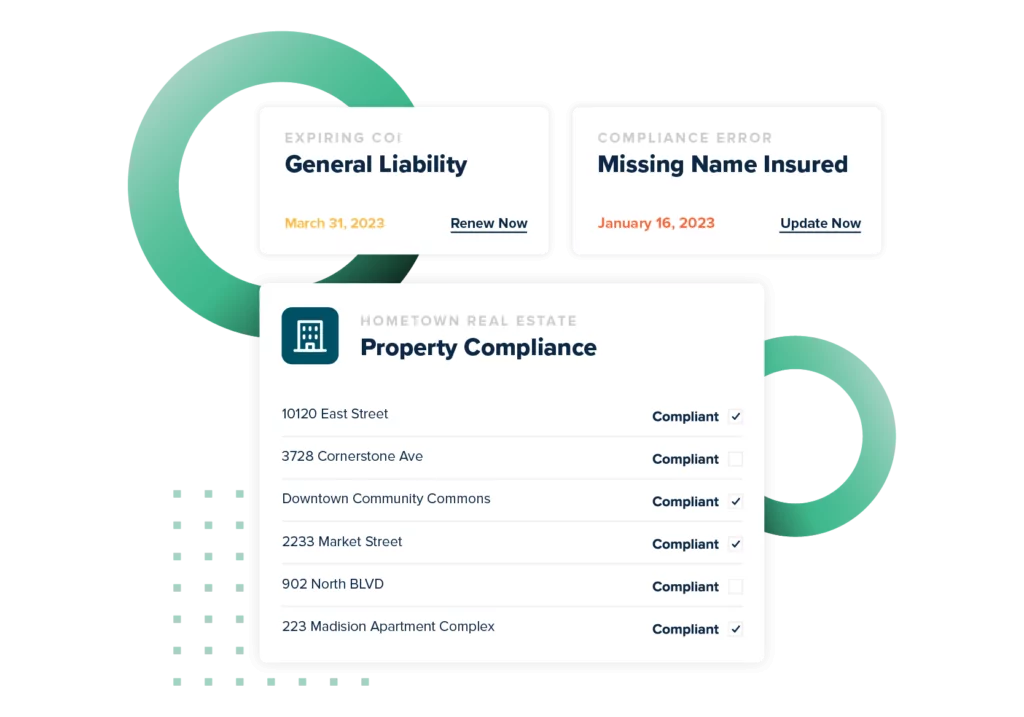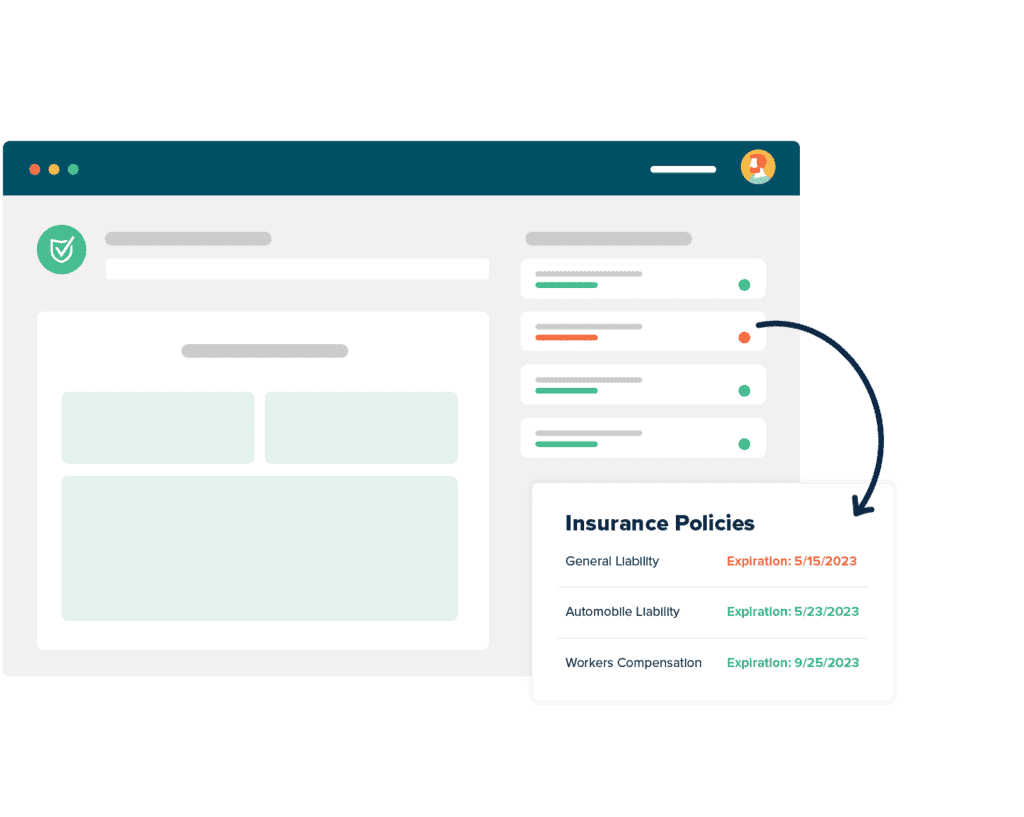Certificate of Insurance for Small Business
Driving about 44% of the economic activity in the United States, small businesses are a hugely important piece of our society today. But with limited resources, they can often become overwhelmed by the world of insurance compliance, including but not limited to the concept of certificates of insurance.
Best Certificate of Insurance Tracking Software

Automate Your COI Tracking
There’s no more need to worry about stacks of certificates cluttering up your office or hours of frustrating phone calls and emails to chase down certificates. myCOI Central provides your company with a solution to automate your insurance certificate requests, collection, and compliance resolution, while also giving your team a single, centralized repository to view compliance.
Protect Your Business From Costly Claims
Ask your CFO or Risk Manager just how much claims and lawsuits can cost your business. If you are collecting certificates just to confirm they were received, you have no guarantee that your requirements are being met. myCOI Central is built on a foundation of insurance industry logic to ensure you remain protected with the appropriate coverage.


For Agents & Brokers
Win business and boost retention by providing agency branded, industry leading insurance tracking software to your insureds. Offer software only or add on your own compliance review services.
What Are The Benefits of COI Software?
View all CasesCertificates of insurance (also known as insurance certificates, or “COIs” for short) are official documents produced by a policyholder’s insurer that provide authoritative evidence of their coverage. It’s essentially a summarized version of an actual policy, with just the details that someone like you, a small business owner, would need in order to verify a vendor’s coverage before hiring them. In this article, we’ll provide answers to commonly asked questions regarding certificates of insurance for small businesses. We’ll cover what a COI is, how it’s involved in business, when and why you’d need one, and how to get a certificate of insurance. Let’s get started!
What Is a Certificate Of Insurance For Business?
A certificate of insurance for a business is an important document that provides evidence of and details about someone’s insurance coverage. They provide legitimacy on behalf of the service provider and substantiate their coverage, often so that they can prove themselves to a prospective client. There are two important reasons why businesses of any size need to know about certificates of insurance. The first is that it’s essential to ensure that any third party you’re hiring has adequate coverage in place. This is both so that they meet any legal or regulatory requirements that pertain to them and so they are able to do their work without fear of being held financially responsible for on-the-job incidents that could occur. The second is that, similarly, you want to protect your business from unnecessary financial hardship in the case that a claim happens and financial damages are due. If the third party is not insured, it could be your business held responsible in the event that they injure themselves or the people around them or damage property. You could even be sued for not confirming that your third party is properly insured. By obtaining COIs from all third parties you hire and ensuring that they are correctly covered, you help your business mitigate risks, reduce the amount of liability you’re exposed to, and avoid potential costly litigation stemming from claims.
What Is a Certificate Of Insurance For Business Example?
While there are many possible examples, here are a few cases where a certificate of insurance for business is necessary. Let’s say that you’re hiring a contractor. In order to get reassurance that your small business won’t be held financially responsible if an accident happens on the job, you should ensure that they, any party you’re planning to hire, have liability insurance that covers them for the time period that they’d be working with you. Since the world of construction can be a dangerous one to work in, it’s often even required for contractors to provide a COI upfront when bidding for a job. Another case that necessitates a certificate of insurance for small businesses is if you wanted to lease a commercial space as a new storefront. To protect yourself as the leasing office from a lawsuit occurring due to accidents occurring on the property, you’d want to require the storefront to obtain small business insurance in the form of a commercial general liability policy (and possibly other coverage). Then, you’d request a COI from their insurer in order to prove they have the needed coverage in place.
What Is The Purpose Of a Certificate Of Insurance?
Certificates of insurance play a crucial role in the insurance compliance process. They are the most common way currently to verify insurance coverage. By providing a summation of key policy details, such as what kind of coverage someone is receiving, as well as limits and expiration dates, COIs help businesses get a quick sense of whether someone’s coverage meets their needs. The alternatives to COIs aren’t great. The first is utilizing actual insurance policies to validate someone’s coverage. While policy documents are lengthy and finding the information you actually need can be difficult, COIs provide an easy rundown of the coverage details you’re looking for. The second is going without verifying coverage for the third parties you hire. This is a bad idea as it could easily lead to damages, claims, and financial losses for your business, which could be disastrous for companies with few assets.
What Must Be Included In a Certificate Of Insurance?
Insurance certificates may differ due to factors such as the kind of insurance policy they’re validating or whether or not additional endorsements are needed. However, here are some of the specifics that must be included in a COI:
- The insurance company’s information. The insurance agency or brokerage providing coverage to the named insured will note it as such on the certificate.
- The policyholder’s information. This covers information about the person/business receiving coverage by the insurance policy. For example, if your small business hires a contractor to do repairs on your shop, the contractor would be the policyholder providing evidence of coverage in that case.
- The policy’s information. This includes the policy number, the type of coverage being provided, the limits of coverage, and the effective dates of coverage.
- The certificate holder’s name. This element communicates who requests and receives the COI as proof of the policyholder’s coverage. In the contractor repairs example from above, where the subcontractor is the policyholder, you, as the hiring party verifying their coverage, would become the certificate holder. It’s important to note that being a “certificate holder” on its own doesn’t provide any coverage for you. For that, you’d need the “Additional Insured” endorsement.
- Any additional information, if needed.
Is a Certificate Of Insurance the Same as an Insurance Policy?
A certificate of insurance is not the same thing as an insurance policy. They’re related, and both are important business concepts, though, so it makes sense how people can confuse the two. If you get stuck, try to recall that an insurance policy means the actual contractual agreement providing the protections. You can also remember that policies require premiums—monthly payments that a policyholder pays to an insurer in exchange for the coverage. A certificate of insurance, on the other hand, is more like the proof of insurance you keep in a vehicle.
When Do You Need a Certificate Of Insurance From a Vendor?
Lots of cases arise where you’ll need to request a COI from a vendor. Practically any time you hire a third party (aka anyone that is outside of your organization and fulfilling a temporary or contracted role), you’re opening your business up to the possibility of risk. This is especially true if they aren’t properly insured. For example, let’s say that you are hiring a supplier to ship materials to you. Before officially entering the business partnership, you should request a COI from them. This is in order to protect their business and yours from unnecessary financial repercussions that could happen if, say, a trucking accident occurred that affected the materials and their anticipated arrival.
How Do I Ask a Vendor For a Certificate Of Insurance?
Let’s jump now to how to get a certificate of insurance. As you go about hiring vendors and other third parties to do work for your small business, it is best practice to request a COI from each of them. You can do this in a few different ways—there’s not one right answer. Certificate of insurance request emails is fairly common in business, although you could also opt for a phone call, mailed letter, or in-person request. We recommend making the request in some kind of writing, as it will help create a paper trail. From there, the third party for whom you need to verify the coverage will make the official request to their insurance agent or broker. Within a few business days (to sometimes weeks), you should receive the generated COI and can begin to determine whether their coverage meets your needs.
As a Third Party Vendor, Can I Issue My Own Certificate Of Insurance?
This is a common question in the insurance compliance space. It is highly unethical to attempt to create or issue your own certificate of insurance. In fact, only the insurance company that is providing the relevant coverage to the policyholder is able to generate the COI corresponding to it.
What Does Certificate Of Insurance Mean In Business?
We’ll finish up by circling back to what a certificate of insurance really means for your small business.
Certificates help your small business avoid costly claims and corresponding financial burdens. They mean that you can protect your hired third-party workers from financial damages that could occur while they do work for you. COIs mean that you can have peace of mind when entering new business relationships. You should consider it essential for all third parties you hire to have sufficient coverage and obtain an insurance certificate from each of them in order to confirm that they do.
How myCOI Can Help
Many small businesses struggle to keep up with compliance requirements, third-party coverage verification, and staying on top of multiple COIs from various vendors. If you’re struggling, you’re not alone, and myCOI can help. Learn how our software has empowered companies large and small to reduce their mental load regarding COIs and get their compliance efforts on track.